Congratulations to Our 27th Annual Meeting Award Winners
Read more about them on our blog - April 10, 2024
We're looking forward to celebrating our 2024 award winners at the upcoming Annual Meeting May 7-11 in Baltimore, MD.
_1.png)
Outstanding Achievement Award
The Outstanding Achievement Award (OAA) recognizes an ASGCT Member who has achieved a pioneering research success, specific high-impact accomplishment, or lifetime of significant contributions to the field of gene and cell therapy. It is the Society’s highest honor. The recipient is celebrated at the Annual Meeting by presenting a keynote lecture highlighting their scientific accomplishments that led to the award.
David Liu, PhD
Broad Institute of MIT and Harvard
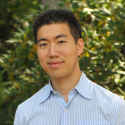 Dr. Liu is the Richard Merkin Professor, director of the Merkin Institute of Transformative Technologies in Healthcare, and vice-chair of the faculty at the Broad Institute of Harvard and MIT. He's also a Thomas Dudley Cabot Professor of the Natural Sciences and professor of chemistry and chemical biology at Harvard University, and a Howard Hughes Medical Institute Investigator. Dr. Liu's major research interests include the engineering, evolution, and in vivo delivery of genome editing agents to study and treat genetic diseases; the evolution of novel therapeutic proteins using phage-assisted continuous evolution (PACE); and the discovery of bioactive synthetic molecules using DNA-templated organic synthesis and DNA-encoded libraries. Dr. Liu's lab pioneered base editing, prime editing, PACE, and DNA-templated synthesis. He has been elected to the U.S. National Academy of Sciences, the U.S. National Academy of Medicine, and the American Association for the Advancement of Science, among numerous other recognitions. Dr. Liu is also the founder or co-founder of several biotechnology and therapeutics companies, including Beam Therapeutics, Prime Medicine, Editas Medicine, Pairwise Plants, Exo Therapeutics, Chroma Medicine, Resonance Medicine, and Nvelop Therapeutics.
Dr. Liu is the Richard Merkin Professor, director of the Merkin Institute of Transformative Technologies in Healthcare, and vice-chair of the faculty at the Broad Institute of Harvard and MIT. He's also a Thomas Dudley Cabot Professor of the Natural Sciences and professor of chemistry and chemical biology at Harvard University, and a Howard Hughes Medical Institute Investigator. Dr. Liu's major research interests include the engineering, evolution, and in vivo delivery of genome editing agents to study and treat genetic diseases; the evolution of novel therapeutic proteins using phage-assisted continuous evolution (PACE); and the discovery of bioactive synthetic molecules using DNA-templated organic synthesis and DNA-encoded libraries. Dr. Liu's lab pioneered base editing, prime editing, PACE, and DNA-templated synthesis. He has been elected to the U.S. National Academy of Sciences, the U.S. National Academy of Medicine, and the American Association for the Advancement of Science, among numerous other recognitions. Dr. Liu is also the founder or co-founder of several biotechnology and therapeutics companies, including Beam Therapeutics, Prime Medicine, Editas Medicine, Pairwise Plants, Exo Therapeutics, Chroma Medicine, Resonance Medicine, and Nvelop Therapeutics.
Outstanding New Investigator Award
Winners of the Outstanding New Investigator (ONI) Award come from academia, research foundations, government, or industry, and are recognized each year based on their contributions to the field of gene and cell therapy. Each awardee will present a keynote lecture at the ASGCT Annual Meeting highlighting their scientific accomplishments that led to the Award.
Agnieszka Czechowicz, MD, PhD
Stanford University
 Dr.Czechowicz is a physician-scientist and biotech entrepreneur with 20 years of experience in stem cell biology and translational research. She is an assistant professor of pediatrics and a member of Stanford's Institute for Stem Cell Biology and Regenerative Medicine. Dr. Czechowicz has done pioneering work showing that hematopoietic stem cell depletion is a critical component to donor hematopoietic stem cell engraftment. She has also led several clinical trials exploring new cell and gene therapy treatments for Fanconi anemia. Dr. Czechowicz’s primary clinical interests are in bone marrow failure (including Fanconi anemia and aplastic anemia) and other diverse diseases that necessitate or could benefit from stem cell transplantation. Her primary research interests are in hematopoietic stem cell biology, transplantation, gene-therapy/gene-editing and regenerative medicine. Multiple pre-clinical and clinical therapies are in development based upon her studies.
Dr.Czechowicz is a physician-scientist and biotech entrepreneur with 20 years of experience in stem cell biology and translational research. She is an assistant professor of pediatrics and a member of Stanford's Institute for Stem Cell Biology and Regenerative Medicine. Dr. Czechowicz has done pioneering work showing that hematopoietic stem cell depletion is a critical component to donor hematopoietic stem cell engraftment. She has also led several clinical trials exploring new cell and gene therapy treatments for Fanconi anemia. Dr. Czechowicz’s primary clinical interests are in bone marrow failure (including Fanconi anemia and aplastic anemia) and other diverse diseases that necessitate or could benefit from stem cell transplantation. Her primary research interests are in hematopoietic stem cell biology, transplantation, gene-therapy/gene-editing and regenerative medicine. Multiple pre-clinical and clinical therapies are in development based upon her studies.
Pietro Genovese, PhD
Dana-Farber Cancer Institute + Harvard Medical School
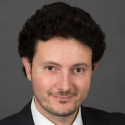 Dr. Genovese is an assistant professor in pediatrics at Harvard Medical School and principal investigator in the gene therapy program at Dana-Farber/Boston Children's Cancer and Blood Disorders Center. Co-author of several high-profile publications, he dedicates his efforts to developing genome editing tools that improve the safety and efficacy of cancer-adoptive immunotherapy or promote safer human stem cell gene therapy applications. Working with the group of Luigi Naldini at the San Raffaele Telethon Institute for Gene Therapy (SR-Tiget), he contributed to pioneer this field since when ZFNs were first shown to enhance gene targeting and be useful for genetic engineering of somatic cells for therapeutic purposes. He recently developed a strategy that allows site-specific integration and in situ gene correction in human long-term repopulating hematopoietic stem cells. His current efforts aim to move these advanced genetic engineering strategies toward an effective treatment for inherited diseases.
Dr. Genovese is an assistant professor in pediatrics at Harvard Medical School and principal investigator in the gene therapy program at Dana-Farber/Boston Children's Cancer and Blood Disorders Center. Co-author of several high-profile publications, he dedicates his efforts to developing genome editing tools that improve the safety and efficacy of cancer-adoptive immunotherapy or promote safer human stem cell gene therapy applications. Working with the group of Luigi Naldini at the San Raffaele Telethon Institute for Gene Therapy (SR-Tiget), he contributed to pioneer this field since when ZFNs were first shown to enhance gene targeting and be useful for genetic engineering of somatic cells for therapeutic purposes. He recently developed a strategy that allows site-specific integration and in situ gene correction in human long-term repopulating hematopoietic stem cells. His current efforts aim to move these advanced genetic engineering strategies toward an effective treatment for inherited diseases.
Jennifer Hamilton, PhD
Innovative Genomics Institute (IGI)
 Dr. Hamilton, currently co-founder of a stealth startup, was previously a postdoc in the Doudna lab at the University of California-Berkeley's Innovative Genomics Institute. In the Doudna lab, she worked to develop novel approaches for delivering CRISPR-based genome editing tools, including exploring a new method of improving targeted genome engineering in humans using CRISPR. Dr. Hamilton’s work builds on her research on viral-like particles (VLPs), where she has demonstrated the ability to target delivery of genome-editing molecules by harnessing the natural abilities of viruses. Precise, in-vivo delivery of CRISPR to specific cells and tissues will further enable new human therapies and lower the cost of treatment. Recently, Dr. Hamilton and colleagues treated live mice that had been equipped with a humanized immune system and turned their human T-cells into CAR T-cells able to home in on and eliminate another class of immune cell, a B cell.
Dr. Hamilton, currently co-founder of a stealth startup, was previously a postdoc in the Doudna lab at the University of California-Berkeley's Innovative Genomics Institute. In the Doudna lab, she worked to develop novel approaches for delivering CRISPR-based genome editing tools, including exploring a new method of improving targeted genome engineering in humans using CRISPR. Dr. Hamilton’s work builds on her research on viral-like particles (VLPs), where she has demonstrated the ability to target delivery of genome-editing molecules by harnessing the natural abilities of viruses. Precise, in-vivo delivery of CRISPR to specific cells and tissues will further enable new human therapies and lower the cost of treatment. Recently, Dr. Hamilton and colleagues treated live mice that had been equipped with a humanized immune system and turned their human T-cells into CAR T-cells able to home in on and eliminate another class of immune cell, a B cell.
Sharif Tabebordbar, PhD
Kate Therapeutics
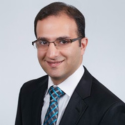 Dr. Tabebordbar is a co-founder and chief scientific officer of Kate Therapeutics. His team combines machine learning guided AAV capsid engineering and regulatory element design to develop safe and effective gene therapy candidates for skeletal muscle and cardiac indications. Dr. Tabebordbar provided the first proof of concept for using in vivo gene editing to treat a mouse model of Duchenne muscular dystrophy as part of his graduate work in the lab of Dr. Amy Wagers. At the Broad Institute of MIT and Harvard, Dr. Tabebordbar developed the DELIVER platform and MyoAAV class of capsids for potent and selective muscle directed AAV-mediated gene delivery. Prior to the Broad, Dr. Tabebordbar was leading development of gene editing based therapeutics for specific genetic muscle disease indications at Editas Medicine.
Dr. Tabebordbar is a co-founder and chief scientific officer of Kate Therapeutics. His team combines machine learning guided AAV capsid engineering and regulatory element design to develop safe and effective gene therapy candidates for skeletal muscle and cardiac indications. Dr. Tabebordbar provided the first proof of concept for using in vivo gene editing to treat a mouse model of Duchenne muscular dystrophy as part of his graduate work in the lab of Dr. Amy Wagers. At the Broad Institute of MIT and Harvard, Dr. Tabebordbar developed the DELIVER platform and MyoAAV class of capsids for potent and selective muscle directed AAV-mediated gene delivery. Prior to the Broad, Dr. Tabebordbar was leading development of gene editing based therapeutics for specific genetic muscle disease indications at Editas Medicine.
Sonia Skarlatos Public Service Award
Named for its inaugural co-recipient and tireless gene therapy advocate,the Sonia Skarlatos Public Service Award (PSA) recognizes a person or group that has consistently fostered and enhanced the field of gene and cell therapy through governmental agencies, public policy groups, public education, or non-governmental charitable organizations.
Pat Furlong
Parent Project Muscular Dystrophy (PPMD)
 Pat is the founding president and CEO of Parent Project Muscular Dystrophy (PPMD), the largest nonprofit organization in the U.S. solely focused on Duchenne muscular dystrophy (DMD). When doctors diagnosed her two sons with the disease in 1984, she immersed herself in DMD, working to understand the pathology of the disorder, the extent of research investment and the mechanisms for optimal care. In 1994, Pat, together with other parents of young men with DMD, founded PPMD to change the course of the disorder and, ultimately, to find a cure. Today, Pat continues to lead the organization and is considered one of the foremost authorities on DMD in the world. She speaks about DMD and related topics at conferences each year worldwide and is an active board member with the National Health Council. She is also a committee member of the Clinical Trials Transformation Initiative and serves on the data safety monitoring board for both the Rare Diseases Clinical Research Network and Cooperative International Neuromuscular Research Group.
Pat is the founding president and CEO of Parent Project Muscular Dystrophy (PPMD), the largest nonprofit organization in the U.S. solely focused on Duchenne muscular dystrophy (DMD). When doctors diagnosed her two sons with the disease in 1984, she immersed herself in DMD, working to understand the pathology of the disorder, the extent of research investment and the mechanisms for optimal care. In 1994, Pat, together with other parents of young men with DMD, founded PPMD to change the course of the disorder and, ultimately, to find a cure. Today, Pat continues to lead the organization and is considered one of the foremost authorities on DMD in the world. She speaks about DMD and related topics at conferences each year worldwide and is an active board member with the National Health Council. She is also a committee member of the Clinical Trials Transformation Initiative and serves on the data safety monitoring board for both the Rare Diseases Clinical Research Network and Cooperative International Neuromuscular Research Group.
Jerry Mendell Award for Translational Science
Named for the first person to study viral mediated gene therapy for muscular dystrophy in humans, and the principal investigator in the study that led to the FDA approval of Zolgensma to treat SMA, the Jerry Mendell Award for Translational Science recognizes the extensive work required to bring gene and cell therapies to clinical trial. Supported by a generous grant from Dr. Suku and Ann Nagendran.
John Tisdale, MD
National Heart, Lung, and Blood Institute (NHLBI)
_1.aspx?width=125&height=125) Dr. Tisdale is a senior investigator in the molecular and clinical hematology section of NHLBI, which is part of NIH. As a physician-scientist, he has been working for many years on strategies to treat sickle cell disease (SCD) by replacing the bone marrow cells that give rise to sickled red blood cells with bone marrow cells from a donor who does not have the disease. Recently, Dr. Tisdale and colleagues completed a modified bone marrow transplant strategy for the first time in adult patients with SCD. Their study results demonstrated that they could transplant bone marrow cells from HLA-matched sibling donors without needing to completely destroy the patient’s immune system. Dr. Tisdale and colleagues also have an ongoing research agenda to find a gene therapy strategy for SCD. They are focused on optimizing the conditions for viral transduction, including selecting and modifying viral strains for study in animal models, optimizing growth conditions for transduced hematopoietic cells, and designing gene vectors to ensure appropriate placement and expression of the inserted gene.
Dr. Tisdale is a senior investigator in the molecular and clinical hematology section of NHLBI, which is part of NIH. As a physician-scientist, he has been working for many years on strategies to treat sickle cell disease (SCD) by replacing the bone marrow cells that give rise to sickled red blood cells with bone marrow cells from a donor who does not have the disease. Recently, Dr. Tisdale and colleagues completed a modified bone marrow transplant strategy for the first time in adult patients with SCD. Their study results demonstrated that they could transplant bone marrow cells from HLA-matched sibling donors without needing to completely destroy the patient’s immune system. Dr. Tisdale and colleagues also have an ongoing research agenda to find a gene therapy strategy for SCD. They are focused on optimizing the conditions for viral transduction, including selecting and modifying viral strains for study in animal models, optimizing growth conditions for transduced hematopoietic cells, and designing gene vectors to ensure appropriate placement and expression of the inserted gene.
Catalyst Award
The ASGCT Catalyst Award recognizes an ASGCT member or team of professionals who have had an extraordinary impact on the translation of gene and cell therapies.
Maritza McIntyre, PhD
Advanced Therapies Partners LLC
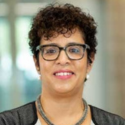 Dr. McIntyre has more than 20 years of experience in the development, evaluation and regulation of gene therapy, biological, and small molecule products within startup biotech, FDA, and consulting. She has proven success in defining development strategies for products with complex regulatory challenges. Dr. McIntyre has multidisciplinary experience, including CMC, preclinical, and clinical with a wide range of product types, including gene and cell therapy products, prophylactic and therapeutic vaccines, biological products, and small molecules at varied stages of product development. An ASGCT member since 2006, she has previously served on the Board of Directors as well as on multiple committees, and currently serves on the Program Committee.
Dr. McIntyre has more than 20 years of experience in the development, evaluation and regulation of gene therapy, biological, and small molecule products within startup biotech, FDA, and consulting. She has proven success in defining development strategies for products with complex regulatory challenges. Dr. McIntyre has multidisciplinary experience, including CMC, preclinical, and clinical with a wide range of product types, including gene and cell therapy products, prophylactic and therapeutic vaccines, biological products, and small molecules at varied stages of product development. An ASGCT member since 2006, she has previously served on the Board of Directors as well as on multiple committees, and currently serves on the Program Committee.
Founders Award
The Founders Award recognizes a pioneering contributor to the gene and cell therapy field. It is among the Society’s highest honors and the recipient presents a keynote lecture highlighting their accomplishments that led to the award.
Kathy High, MD
Rockefeller University
 Dr. High has been a pioneer in gene therapy, with a focus on basic, translational, and clinical investigation in gene therapy. She is known for her studies in adeno-associated viral (AAV)-mediated gene therapy for hemophilia, including the development of AAV vectors that brought about long-term improvement in small and large animal models of hemophilia. She translated these findings to studies of men with severe hemophilia, and overcame hurdles identified in clinical trials including the risk of germline transmission and human immune response to the AAV vector. She is an Emeritus Professor at the Perelman School of Medicine at the University of Pennsylvania. Previously, she has served on faculties at UNC, as president of therapeutics at AskBio, and as co-founder, president, chief scientific officer, and board member of Spark Therapeutics. At Spark, Dr. High led the team that earned the first FDA approval of a gene therapy for a genetic disease, a rare form of inherited blindness.
Dr. High has been a pioneer in gene therapy, with a focus on basic, translational, and clinical investigation in gene therapy. She is known for her studies in adeno-associated viral (AAV)-mediated gene therapy for hemophilia, including the development of AAV vectors that brought about long-term improvement in small and large animal models of hemophilia. She translated these findings to studies of men with severe hemophilia, and overcame hurdles identified in clinical trials including the risk of germline transmission and human immune response to the AAV vector. She is an Emeritus Professor at the Perelman School of Medicine at the University of Pennsylvania. Previously, she has served on faculties at UNC, as president of therapeutics at AskBio, and as co-founder, president, chief scientific officer, and board member of Spark Therapeutics. At Spark, Dr. High led the team that earned the first FDA approval of a gene therapy for a genetic disease, a rare form of inherited blindness.
Exemplary Service Award
The Exemplary Service Award recognizes individuals for their outstanding contributions to ASGCT and their commitment to the Society’s mission to advance knowledge, education, and awareness of gene and cell therapy. Exemplary service may include significant and sustained leadership, expertise, and/or creativity in addressing issues of importance to ASGCT.
Roland Herzog, PhD
Indiana University School of Medicine
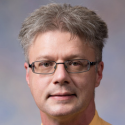 Dr. Herzog is a professor of pediatrics, Riley Children's Foundation Professor of Immunology, and director of the gene and cell therapy program at Indiana University School of Medicine. At the university, his research lab develops adeno-associated viral (AAV) based gene therapies and immune tolerance induction protocols for the X-linked bleeding disorder hemophilia and other diseases. He is also the current editor-in-chief of Molecular Therapy. His research interests are in gene therapy and immune tolerance for hemophilia as well as in AAV vectors. He received a PhD in Microbiology from Auburn University in 1996, followed by postdoctoral training at the Children’s Hospital of Philadelphia and faculty appointment at the University of Pennsylvania, before joining the University of Florida in 2005 and then Indiana University in 2018. Dr. Herzog received multiple awards for his research from ASGCT, the National Hemophilia Foundation, the Bayer Hemophilia Program, and the University of Florida Research Foundation, among others. Dr. Herzog’s work is supported by multiple grants from the National Institutes of Health.
Dr. Herzog is a professor of pediatrics, Riley Children's Foundation Professor of Immunology, and director of the gene and cell therapy program at Indiana University School of Medicine. At the university, his research lab develops adeno-associated viral (AAV) based gene therapies and immune tolerance induction protocols for the X-linked bleeding disorder hemophilia and other diseases. He is also the current editor-in-chief of Molecular Therapy. His research interests are in gene therapy and immune tolerance for hemophilia as well as in AAV vectors. He received a PhD in Microbiology from Auburn University in 1996, followed by postdoctoral training at the Children’s Hospital of Philadelphia and faculty appointment at the University of Pennsylvania, before joining the University of Florida in 2005 and then Indiana University in 2018. Dr. Herzog received multiple awards for his research from ASGCT, the National Hemophilia Foundation, the Bayer Hemophilia Program, and the University of Florida Research Foundation, among others. Dr. Herzog’s work is supported by multiple grants from the National Institutes of Health.
Award for Advancing Excellence in Diversity, Equity, and Inclusion (DEI)
The Award for Advancing Excellence in DEI recognizes individuals, organizations, or other entities for their outstanding contributions toward the Society’s principles and programs advancing diversity, equity, and inclusion. The award may honor individuals who have demonstrated excellence in the development of a more diverse and inclusive field of gene and cell therapy; career development of underrepresented minority students, trainees, and early career professionals; or advancement of gene and cell therapies benefitting more diverse and inclusive patient populations.
Innovative Genomics Institute (IGI)
.png)
The Innovative Genomics Institute (IGI) is a joint effort between the Bay Area’s leading scientific research institutions, UC Berkeley and UC San Francisco, with affiliates at UC Davis, Lawrence Berkeley National Laboratory, Lawrence Livermore National Laboratory, Gladstone Institutes, and other institutions. The IGI’s diverse group of leading scientists have powerful interdisciplinary expertise. They conduct world-class research, driven by the real possibility of using genome engineering to treat human diseases, end hunger, and respond to climate change. In addition to our scientific efforts, the IGI is committed to advancing public understanding of genome engineering, providing resources for the broader community, and guiding the ethical use of these technologies.
George Stamatoyannopoulos Mentorship Award
The Mentorship Award recognizes individuals for their outstanding contributions toward the mentorship, training, education, or support of students, residents, fellows, trainees, or other early career professionals either through formal training programs or through non-traditional means. The award will highlight the contributions of mentors that have had a profound impact on the gene and cell therapy community and/or individual mentees.
The name of this award honors the legacy of George Stamatoyannopoulos. This award is possible thanks to a generous contribution from Thalia Papayannopoulou, MD, Dr Med. Sci.
Cynthia "Cindy" Dunbar, MD
National Institutes of Health (NIH)
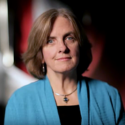 Dr. Dunbar is chief of the translational stem cell biology branch and head of the molecular hematopoiesis section at the National Heart, Lung, and Blood Institute (NHLBI) of the National Institutes of Health (NIH). She has pursued a career encompassing clinical investigation and patient care, basic science, and education/administration. As a translational research scientist, Dr. Dunbar has made important findings in the areas of hematopoiesis, stem cell biology, leukemogenesis, natural killer cell biology, and gene therapies, focusing on non-human primate models to provide insights not possible using murine or in vitro models. Her research group provided the first direct evidence for self-renewal and long-term persistence of mature natural killer cells, explaining aspects of natural killer cell memory and providing insights into dynamics of these cells following infections or as therapies to fight cancer. She has also led important clinical trials in gene therapy, transplantation, autoimmune disease, and bone marrow failure. Her group led the clinical development of approaches to stimulate human hematopoietic stem cells in vivo, most notably in patients with severe refractory aplastic anemia.
Dr. Dunbar is chief of the translational stem cell biology branch and head of the molecular hematopoiesis section at the National Heart, Lung, and Blood Institute (NHLBI) of the National Institutes of Health (NIH). She has pursued a career encompassing clinical investigation and patient care, basic science, and education/administration. As a translational research scientist, Dr. Dunbar has made important findings in the areas of hematopoiesis, stem cell biology, leukemogenesis, natural killer cell biology, and gene therapies, focusing on non-human primate models to provide insights not possible using murine or in vitro models. Her research group provided the first direct evidence for self-renewal and long-term persistence of mature natural killer cells, explaining aspects of natural killer cell memory and providing insights into dynamics of these cells following infections or as therapies to fight cancer. She has also led important clinical trials in gene therapy, transplantation, autoimmune disease, and bone marrow failure. Her group led the clinical development of approaches to stimulate human hematopoietic stem cells in vivo, most notably in patients with severe refractory aplastic anemia.
Hear more from these awardees at the 27th Annual Meeting
Related Articles